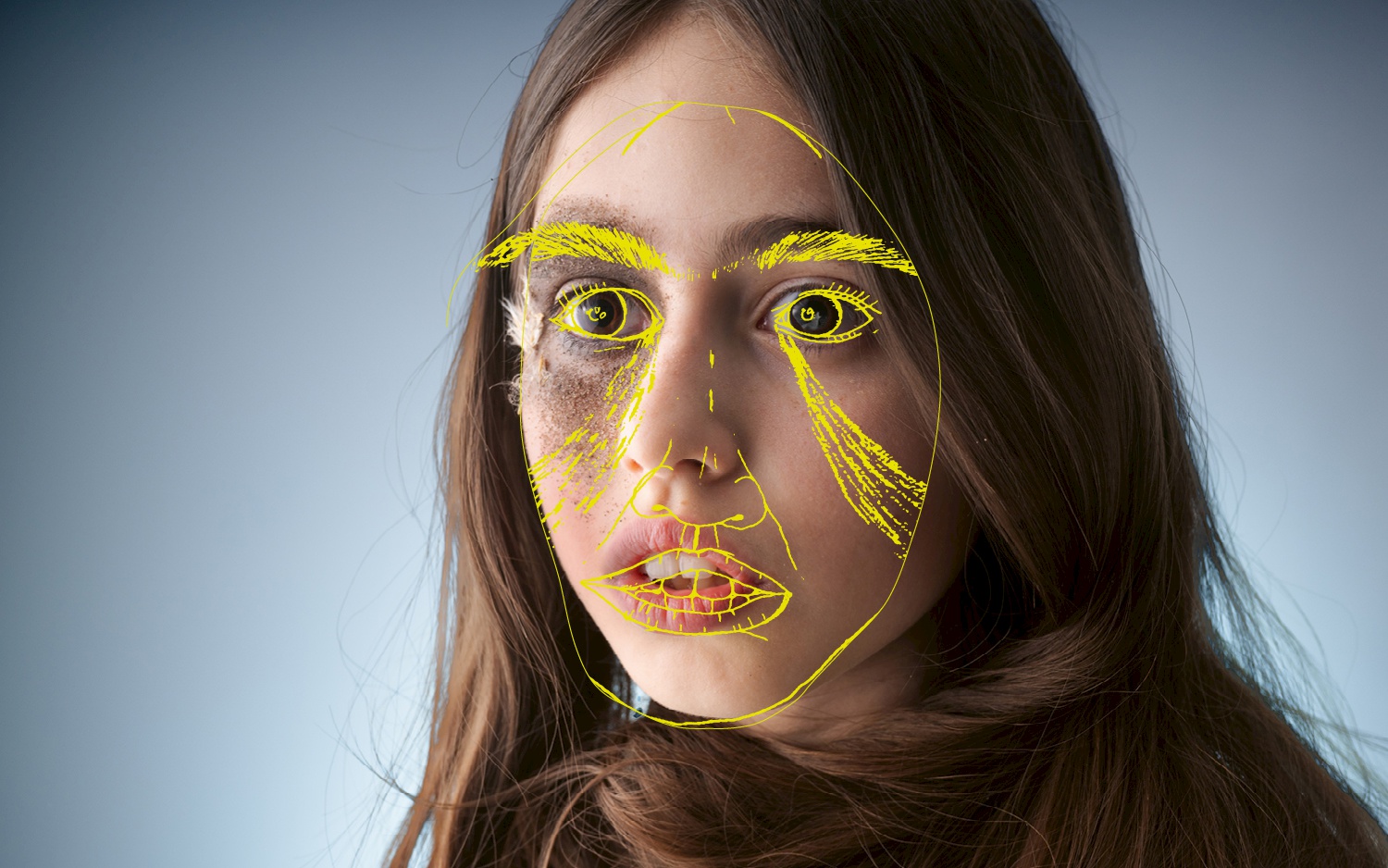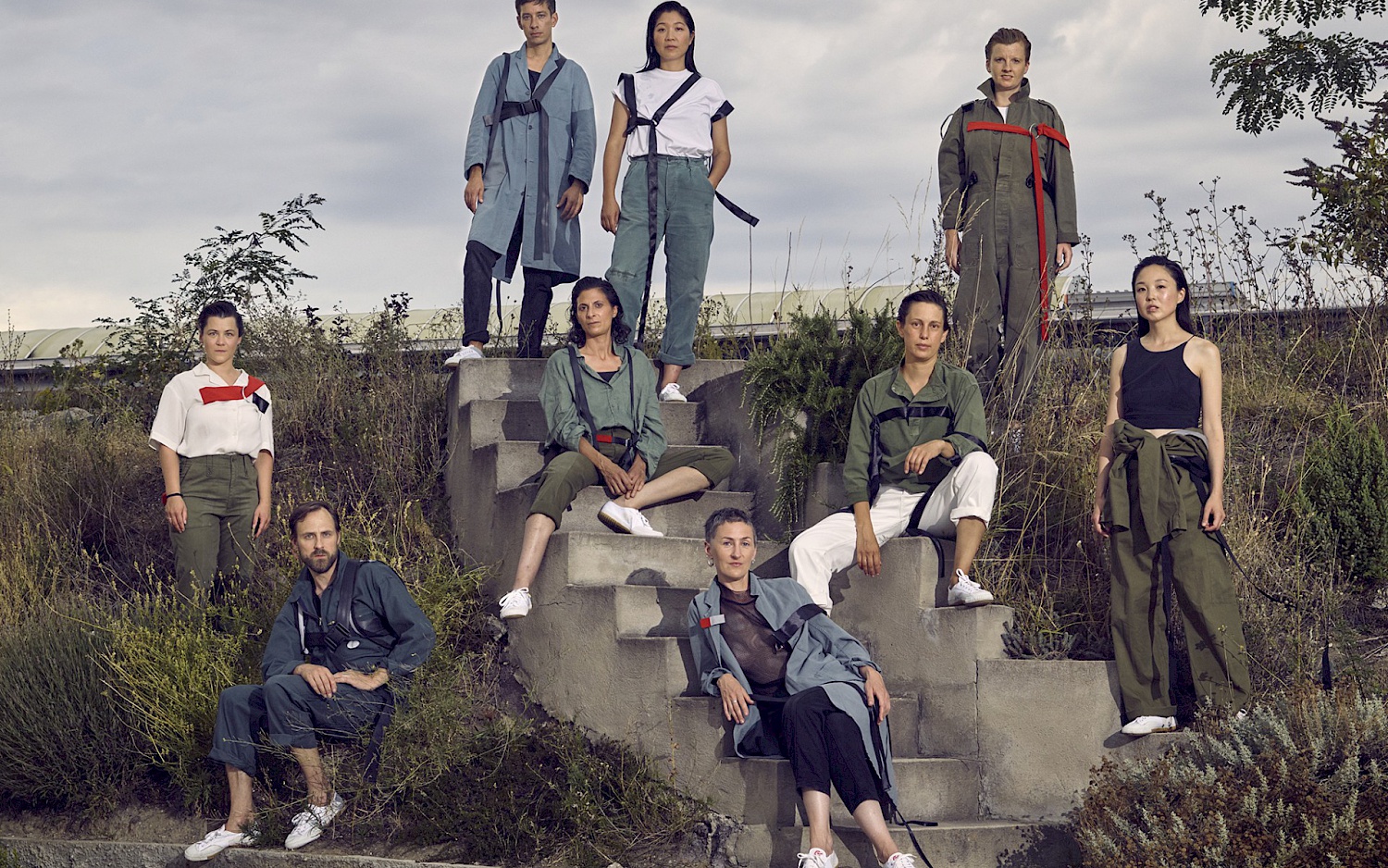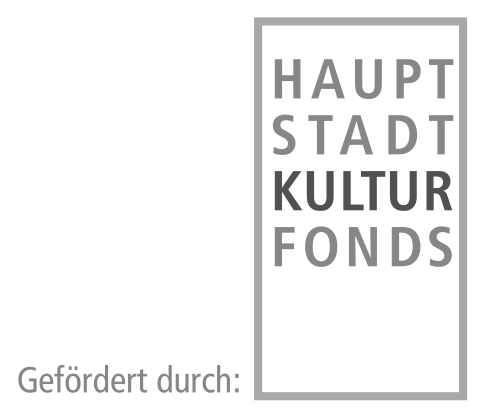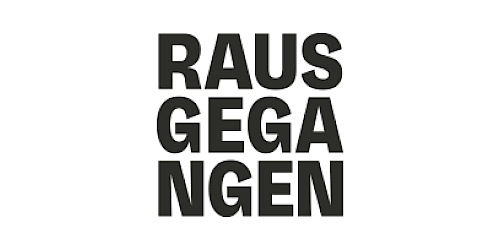Buffalo Gals, Won’t You Come Out Tonight
Music theatre by Solistenensemble Kaleidoskop & Silvia Costa, Andrea Belfi, Wojtek Blecharz
Music theatre
Ticket Prices
Pay what you can
15 / 20 / 25 (recommended) / 30 Euro
reduced 12 Euro
Dear audience, rising costs and inflation have not spared us all. More than ever, artists are dependent on ticket income from performances. Because we know that others are in a similar situation, we have decided in favour of a solidarity-based pricing system: We want to enable those for whom money is tight to attend the performance with a more favourable ticket price (€15 - €20) and encourage those who are willing and able to pay a higher ticket price (€20 - €30). Solistenensemble Kaleidoskop
Free choice of seating.
Ticket Prices
Pay what you can
15 / 20 / 25 (recommended) / 30 Euro
reduced 12 Euro
Dear audience, rising costs and inflation have not spared us all. More than ever, artists are dependent on ticket income from performances. Because we know that others are in a similar situation, we have decided in favour of a solidarity-based pricing system: We want to enable those for whom money is tight to attend the performance with a more favourable ticket price (€15 - €20) and encourage those who are willing and able to pay a higher ticket price (€20 - €30). Solistenensemble Kaleidoskop
Free choice of seating.
Ticket Prices
Pay what you can
15 / 20 / 25 (recommended) / 30 Euro
reduced 12 Euro
Dear audience, rising costs and inflation have not spared us all. More than ever, artists are dependent on ticket income from performances. Because we know that others are in a similar situation, we have decided in favour of a solidarity-based pricing system: We want to enable those for whom money is tight to attend the performance with a more favourable ticket price (€15 - €20) and encourage those who are willing and able to pay a higher ticket price (€20 - €30). Solistenensemble Kaleidoskop
Free choice of seating.
Beauty and conflict between two worlds is at the centre of the new music theater production by Solistenensemble Kaleidoskop, “Buffalo Gals, Won't You Come Out Tonight”, based on Ursula K. Le Guin's eponymous utopian fable. This marks the first time that Director Silvia Costa and composers Andrea Belfi and Wojtek Blecharz have collaborated with the ensemble, as they jointly translate this tale about the meeting of different worlds into a visual and musical stage performance. Together, they explore how multi-perspectivity can create a new experience and a new sound.
Le Guin's “Buffalo Gals, Won't You Come Out Tonight” (1987) tells the story of a girl, Myra, who finds herself in the middle of a barren landscape with a wounded eye. A coyote comes to her rescue and takes her to a village full of talking animal presences. In a ceremonial ritual, her injured eye is replaced by that of a coyote, allowing her to perceive and understand both animals and humans. Fascinated and torn between these two worlds, a new experiential world emerges from the ambivalence and ambiguity of her position.
Director Silvia Costa develops a symbolic and pictorial language for the stage, interweaving visuality, text and music. Wojtek Blecharz’s compositions reflect his interest in the interplay between body and instrument; his abstract and haptic music comprises sounds that often integrate the musicians' gestures and movements. Percussionist, composer and experimental musician Andrea Belfi uses minimalist facets to create seemingly endless, energetic soundscapes to hypnotic effect. Over the course of the piece, the music of both composers entwines and overlaps to create a new sonic world.
The work of the Solistenensemble Kaleidoskop features projects of shared authorship that have been developed in collaboration with artists from other genres and cultural backgrounds. This practice thrives on the courage and ability to constantly subject their own processes to other perspectives, as reflected in Le Guin's story. This approach abandons traditional hierarchies in favour of collaboration and communication. As per usual for the ensemble, the musicians appear onstage as performers, alongside Minh Duc Pham, NicoNote and Minou Monfared, and are visible and audible with their bodies, voices and instruments.
Cast
Solistenensemble Kaleidoskop
Violine
Mia Bodet
Anna Faber
Mari Sawada
Viola
Ildiko Ludwig
Yodfat Miron
Cello
Isabelle Klemt
Sophie Notte
Percussion
Andrea Belfi
Performance Coyote
Minh Duc Pham
Performance Myra
Minou Monfared
Performance Grandmother
NicoNote
Direction and Stage
Silvia Costa
Composition
Andrea Belfi
Wojtek Blecharz
Musical dramaturgy and artistic project management
Boram Lie
Künstlerische Projektleitung
Volker Hormann
Artistic production management
Philip Decker
Sound design, collaboration on stage and prop construction
Davis Hart
Light Design
Andrea Sanson
Costume Design
Cristina Nyffeler
Assistant director
Rosabel Huguet Dueñas
Costume assistance
Lenna Stam
Musical assistance
Grégoire Simon
Press and public relations
Nora Gores
Biographien
Das 2006 gegründete Solistenensemble Kaleidoskop hat sich der Entwicklung neuer Formen des experimentellen Musiktheaters verschrieben. Es erforscht Arbeitsweisen, die im Musikalischen, Körperlichen, Theatralen und Visuellen verankert sind. Das Ensemble verbindet sich mit Künstler*innen unterschiedlicher Genres und kultureller Prägungen und erprobt die Körper- und Raumwerdung von Musik in neuen, lebendigen Zusammenhängen. Die Mitglieder des Ensembles haben sich dabei von reinen Instrumentalist*innen zu musikalischen Performer*innen und Co-Autor*innen der kollaborativen Produktionen entwickelt. Kaleidoskop begreift das Musiktheater als einen Ort der Begegnung, der die Kraft hat, sich andere Zukunftsformen vorzustellen. Mit dieser großen Experimentierfreude, vereint mit außergewöhnlicher musikalischer Qualität, ist Kaleidoskop seit seinem Bestehen zu einem wichtigen Impulsgeber im Konzertleben geworden und zählt international zu den gefragtesten Ensembles seiner Generation.
Silvia Costa studierte Bildende Kunst und Theater in Venedig. Danach begann sie mit der Entwicklung einer eigenen poetischen und visuellen Theatersprache. Durch ihre vielfältigen Tätigkeiten als Schriftstellerin, Regisseurin, Performerin und Bühnenbildnerin verbindet sie in ihrer Theatersprache verschiedene ästhetische Herangehensweisen. Von 2006 bis 2019 war sie als Schauspielerin und künstlerische Mitarbeiterin an den meisten Theater- und Opernproduktionen von Romeo Castellucci beteiligt. Seither hat sie eigene Inszenierungen an Theatern und Opernhäusern vor allem in Frankreich und Deutschland realisiert, wie den Staatsopern Berlin, Hannover und Stuttgart, dem Residenztheater München, der Comédie-Française Paris und der Comedie de Valence.
Der in Italien geborene Andrea Belfi ist ein in Berlin lebender Schlagzeuger, Komponist und Experimentalmusiker. Belfi schafft in seiner Musik mit minimalen Elementen, in der sich die komplexen Klangfarben der Akustik mit den unendlichen Möglichkeiten der Elektronik verbinden, scheinbar endlose, energiegeladene Klanglandschaften. Belfi ist international bekannt für seine Live-Performances, die sich in weitläufigen, immersiven Klangwelten entfalten. In den letzten Jahren arbeitete und tourte er mit Künstlern wie Nils Frahm, Mouse on Mars, Jóhann Jóhannsson, Mike Watt, Circuit des Yeux und David Grubbs. Er stand u.a. auf der Bühne der Philharmonie de Paris, des Montreux Jazz Festival, des Greek Theater (Los Angeles), des Unsound Festival (Krakau), des Barbican Center (London), des Issue Project Room (New York) und des CTM Festival (Berlin).
Wojtek Blecharz, 1981 in Gdynia, Polen geboren, schloss 2006 seinen Master of Arts an der Fryderyk-Chopin-Musikuniversität in Warschau ab und promovierte 2015 in Komposition an der University of California, San Diego. 2012-2019 kuratierte er das Instalacje Musikfestival für nichtkonzertante Musik im Nowy Teatr in Warschau. Zu seinen Werken zählen unter anderem die Operninstallationen „Transcryptum“ (2013), „Park-Opera“ (2016) und „Body-Opera“ (2018). 2018 komponierte er die Oper „Fiasko“, 2019 „Rechnitz“, beide basierend auf Texten von Elfriede Jelinek. Blecharz' Musik definiert oft das traditionelle Konzertformat neu und schlägt andere Beziehungen zwischen Zuhörenden und Klang vor. Seine Musik umfasst ortsspezifische Projekte, ein partizipatives Publikum, Elemente des Musik- und Instrumentaltheaters sowie das Eintauchen in und die Verkörperung von Klang.
Programme
Duration approx. 80 minutes
Language
In English language.
Text from ‘Buffalo Gals, Won't You Come Out Tonight’ by Ursula K. Le Guin
There will be a short sequence with a strobe effect during the performance.
Credits
A production by Solistenensemble Kaleidoskop. Supported by the Capital Cultural Fund.
Solistenensemble Kaleidoskop will receive a grant for independent groups without their own venue from the Senate Department for Culture and Social Cohesion in 2024.
Media partnerships Radialsystem: The Berliner, Rausgegangen, tip Berlin, taz. die tageszeitung
Beauty and conflict between two worlds is at the centre of the new music theater production by Solistenensemble Kaleidoskop, “Buffalo Gals, Won't You Come Out Tonight”, based on Ursula K. Le Guin's eponymous utopian fable. This marks the first time that Director Silvia Costa and composers Andrea Belfi and Wojtek Blecharz have collaborated with the ensemble, as they jointly translate this tale about the meeting of different worlds into a visual and musical stage performance. Together, they explore how multi-perspectivity can create a new experience and a new sound.
Le Guin's “Buffalo Gals, Won't You Come Out Tonight” (1987) tells the story of a girl, Myra, who finds herself in the middle of a barren landscape with a wounded eye. A coyote comes to her rescue and takes her to a village full of talking animal presences. In a ceremonial ritual, her injured eye is replaced by that of a coyote, allowing her to perceive and understand both animals and humans. Fascinated and torn between these two worlds, a new experiential world emerges from the ambivalence and ambiguity of her position.
Director Silvia Costa develops a symbolic and pictorial language for the stage, interweaving visuality, text and music. Wojtek Blecharz’s compositions reflect his interest in the interplay between body and instrument; his abstract and haptic music comprises sounds that often integrate the musicians' gestures and movements. Percussionist, composer and experimental musician Andrea Belfi uses minimalist facets to create seemingly endless, energetic soundscapes to hypnotic effect. Over the course of the piece, the music of both composers entwines and overlaps to create a new sonic world.
The work of the Solistenensemble Kaleidoskop features projects of shared authorship that have been developed in collaboration with artists from other genres and cultural backgrounds. This practice thrives on the courage and ability to constantly subject their own processes to other perspectives, as reflected in Le Guin's story. This approach abandons traditional hierarchies in favour of collaboration and communication. As per usual for the ensemble, the musicians appear onstage as performers, alongside Minh Duc Pham, NicoNote and Minou Monfared, and are visible and audible with their bodies, voices and instruments.
Cast
Solistenensemble Kaleidoskop
Violine
Mia Bodet
Anna Faber
Mari Sawada
Viola
Ildiko Ludwig
Yodfat Miron
Cello
Isabelle Klemt
Sophie Notte
Percussion
Andrea Belfi
Performance Coyote
Minh Duc Pham
Performance Myra
Minou Monfared
Performance Grandmother
NicoNote
Direction and Stage
Silvia Costa
Composition
Andrea Belfi
Wojtek Blecharz
Musical dramaturgy and artistic project management
Boram Lie
Künstlerische Projektleitung
Volker Hormann
Artistic production management
Philip Decker
Sound design, collaboration on stage and prop construction
Davis Hart
Light Design
Andrea Sanson
Costume Design
Cristina Nyffeler
Assistant director
Rosabel Huguet Dueñas
Costume assistance
Lenna Stam
Musical assistance
Grégoire Simon
Press and public relations
Nora Gores
Biographies
Das 2006 gegründete Solistenensemble Kaleidoskop hat sich der Entwicklung neuer Formen des experimentellen Musiktheaters verschrieben. Es erforscht Arbeitsweisen, die im Musikalischen, Körperlichen, Theatralen und Visuellen verankert sind. Das Ensemble verbindet sich mit Künstler*innen unterschiedlicher Genres und kultureller Prägungen und erprobt die Körper- und Raumwerdung von Musik in neuen, lebendigen Zusammenhängen. Die Mitglieder des Ensembles haben sich dabei von reinen Instrumentalist*innen zu musikalischen Performer*innen und Co-Autor*innen der kollaborativen Produktionen entwickelt. Kaleidoskop begreift das Musiktheater als einen Ort der Begegnung, der die Kraft hat, sich andere Zukunftsformen vorzustellen. Mit dieser großen Experimentierfreude, vereint mit außergewöhnlicher musikalischer Qualität, ist Kaleidoskop seit seinem Bestehen zu einem wichtigen Impulsgeber im Konzertleben geworden und zählt international zu den gefragtesten Ensembles seiner Generation.
Silvia Costa studierte Bildende Kunst und Theater in Venedig. Danach begann sie mit der Entwicklung einer eigenen poetischen und visuellen Theatersprache. Durch ihre vielfältigen Tätigkeiten als Schriftstellerin, Regisseurin, Performerin und Bühnenbildnerin verbindet sie in ihrer Theatersprache verschiedene ästhetische Herangehensweisen. Von 2006 bis 2019 war sie als Schauspielerin und künstlerische Mitarbeiterin an den meisten Theater- und Opernproduktionen von Romeo Castellucci beteiligt. Seither hat sie eigene Inszenierungen an Theatern und Opernhäusern vor allem in Frankreich und Deutschland realisiert, wie den Staatsopern Berlin, Hannover und Stuttgart, dem Residenztheater München, der Comédie-Française Paris und der Comedie de Valence.
Der in Italien geborene Andrea Belfi ist ein in Berlin lebender Schlagzeuger, Komponist und Experimentalmusiker. Belfi schafft in seiner Musik mit minimalen Elementen, in der sich die komplexen Klangfarben der Akustik mit den unendlichen Möglichkeiten der Elektronik verbinden, scheinbar endlose, energiegeladene Klanglandschaften. Belfi ist international bekannt für seine Live-Performances, die sich in weitläufigen, immersiven Klangwelten entfalten. In den letzten Jahren arbeitete und tourte er mit Künstlern wie Nils Frahm, Mouse on Mars, Jóhann Jóhannsson, Mike Watt, Circuit des Yeux und David Grubbs. Er stand u.a. auf der Bühne der Philharmonie de Paris, des Montreux Jazz Festival, des Greek Theater (Los Angeles), des Unsound Festival (Krakau), des Barbican Center (London), des Issue Project Room (New York) und des CTM Festival (Berlin).
Wojtek Blecharz, 1981 in Gdynia, Polen geboren, schloss 2006 seinen Master of Arts an der Fryderyk-Chopin-Musikuniversität in Warschau ab und promovierte 2015 in Komposition an der University of California, San Diego. 2012-2019 kuratierte er das Instalacje Musikfestival für nichtkonzertante Musik im Nowy Teatr in Warschau. Zu seinen Werken zählen unter anderem die Operninstallationen „Transcryptum“ (2013), „Park-Opera“ (2016) und „Body-Opera“ (2018). 2018 komponierte er die Oper „Fiasko“, 2019 „Rechnitz“, beide basierend auf Texten von Elfriede Jelinek. Blecharz' Musik definiert oft das traditionelle Konzertformat neu und schlägt andere Beziehungen zwischen Zuhörenden und Klang vor. Seine Musik umfasst ortsspezifische Projekte, ein partizipatives Publikum, Elemente des Musik- und Instrumentaltheaters sowie das Eintauchen in und die Verkörperung von Klang.








